Asia is the largest download market for AI applications, while the US market leads in in-app purchase revenue for AI applications.
Mobile app data analytics firm Sensor Tower has released its latest report, "State of AI Apps Report 2025," analyzing the state of the mobile AI market. Here are some key points we have summarized:
In the first half of 2025, global downloads of generative AI applications (AI assistants + AI content generators) approached 1.7 billion, with in-app purchase (IAP) revenue nearing $1.9 billion, representing a 67% quarter-over-quarter growth and a doubling of revenue.
Asia (especially China and India) has become the main driver of download growth, with an 80% increase in AI application downloads in Asia in the first half of 2025, significantly higher than the global average.
Generative AI applications are crossing verticals and have widely penetrated various applications in health, education, entertainment, finance, etc. AI has become a "standard" feature for enhancing user experience.
Leading AI assistants (such as ChatGPT, Google Gemini, DeepSeek) are continuously adding new features like image generation and voice chat, strengthening user engagement and differentiation.
New AI applications like DeepSeek have achieved rapid user expansion and surpassed download volumes in the Asian, Middle Eastern, and African markets.
Mainstream AI assistant users are still predominantly young males, but the proportion of female users for leading products has exceeded 30%, with segmented scenarios (such as entertainment, social, health) driving more diverse demographics to engage.
The number of active days per month for users continues to rise, with ChatGPT users globally being active for an average of 13 days per month, with usage frequency approaching that of social platforms like X (formerly Twitter) and Reddit.
For AI applications to successfully break out, they need to deeply understand the needs of target users, accurately match features with scenarios, and enhance user acquisition and conversion efficiency.
In the past year, the proportion of keywords related to "life and entertainment" in ChatGPT conversations increased from 22% to 35%, with health and shopping becoming the fastest-growing use case categories.
Vertical applications face the pressure of being "disrupted"; unless they can achieve value deepening through more refined AI capabilities (such as specialized recognition and vertical data integration), they are likely to be replaced by general AI; education/translation/nutrition sectors must pay special attention to this challenge.
Incorporating "AI" into application names/descriptions can lead to significant download growth, with median download increases of up to 4.1% within three months (more pronounced on iOS).
Application screenshots/keyword promotion images featuring image generation functions, cartoon images, and other fun scenarios have become mainstream, effectively attracting new users.
In vertical sectors such as nutrition, translation, note-taking, and exam preparation, leading applications are massively introducing AI labels and capabilities, intensifying competition.
The speed of innovation and iteration determines survival: continuously focus on expanding new scenarios (image, voice, health, life), quickly test new demands, and avoid being replaced by mainstream AI assistants.
Focus on segmented vertical scenarios: create specialized/localized application solutions based on AI capabilities (for example, customized AI nutrition tracking, medical applications), forming barriers.
Make good use of ASO and advertising benefits: optimize app store strategies with "AI" terminology, promote innovative features with product screenshots, and invest in precise marketing through segmented channels.
Founder Park has extracted some highlights from the report; for the complete report, see: https://e.infogram.com/_/sQPY5Dm8I7WWPgu4Tt8s?src=embed
Note: The download and in-app purchase (IAP) revenue estimates in the report are compiled by the Sensor Tower insights team based on its mobile app insights platform.
The data statistics cover the period from January 1, 2014, to June 30, 2025, including download and IAP revenue estimates from the App Store and Google Play platforms.
Asia is the largest download market for AI applications, while the US market leads in in-app purchase revenue for AI applications
Since the release of ChatGPT over two years ago, enthusiasm for AI has continued to soar, and the demand for mobile AI has been growing rapidly.
According to the report, in the first half of 2025, global downloads of generative AI applications (including AI assistants and AI content generators) approached 1.7 billion, with in-app purchase (IAP) revenue reaching nearly $1.9 billion. Notably, the quarter-over-quarter growth rates for downloads and IAP revenue are still on the rise. In the first half of 2025, downloads increased by 67%, marking the fastest growth rate since the first half of 2023. IAP revenue also showed a similar strong trend, with consumer spending in the first half of 2025 doubling compared to the second half of 2024.
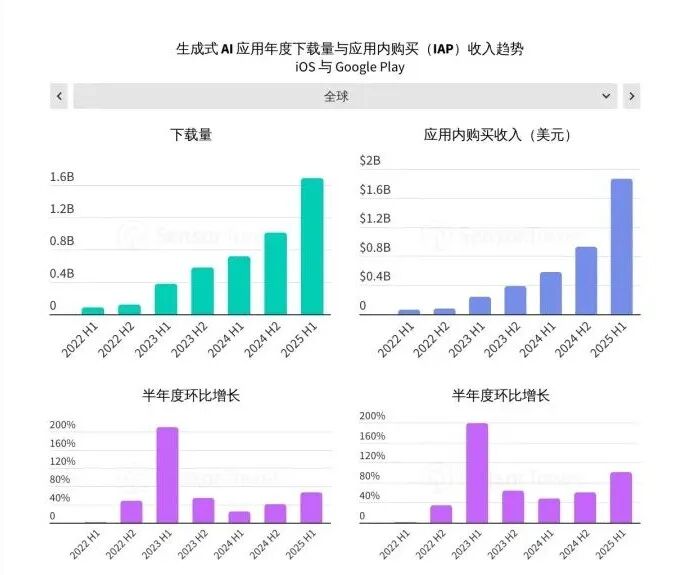
AI application downloads in Asia surge by 80%
After the release of ChatGPT, the English-speaking market, represented by the US, quickly became an early adopter of generative AI applications, initially accounting for about 20% of global downloads in North America. However, as generative AI applications became popular worldwide, the download share in North America fell to 11% in the first half of 2025. Nevertheless, downloads in the region are still on the rise.
Asia has become the largest download market for generative AI applications, with markets like India and mainland China experiencing particularly rapid growth. From the second half of 2024 to the first half of 2025, downloads of generative AI applications in the Asian market surged by 80%, significantly surpassing Europe (51%) and North America (39%) during the same period.
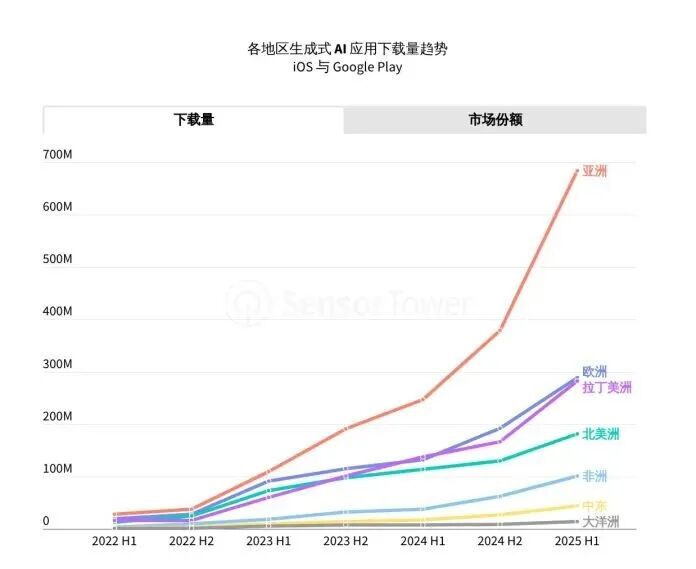
The US market leads in AI application in-app purchase revenue, while other regions show stronger growth momentum
In the first half of 2025, IAP revenue from generative AI applications experienced rapid growth globally. The North American market led with $762 million in IAP revenue, achieving a quarter-over-quarter growth rate of 74%. Notably, ChatGPT holds an absolute dominant position in application revenue; except for the mainland China market, it ranks first in all major markets, contributing 63% of the total revenue from generative AI applications in the first half of 2025. This trend clearly reveals the enormous monetization potential of generative AI applications worldwide. From the second half of 2024 to the first half of 2025, regions such as Latin America (147% growth), Asia (136%), the Middle East (131%), and Europe (121%) all achieved doubling growth in IAP revenue.
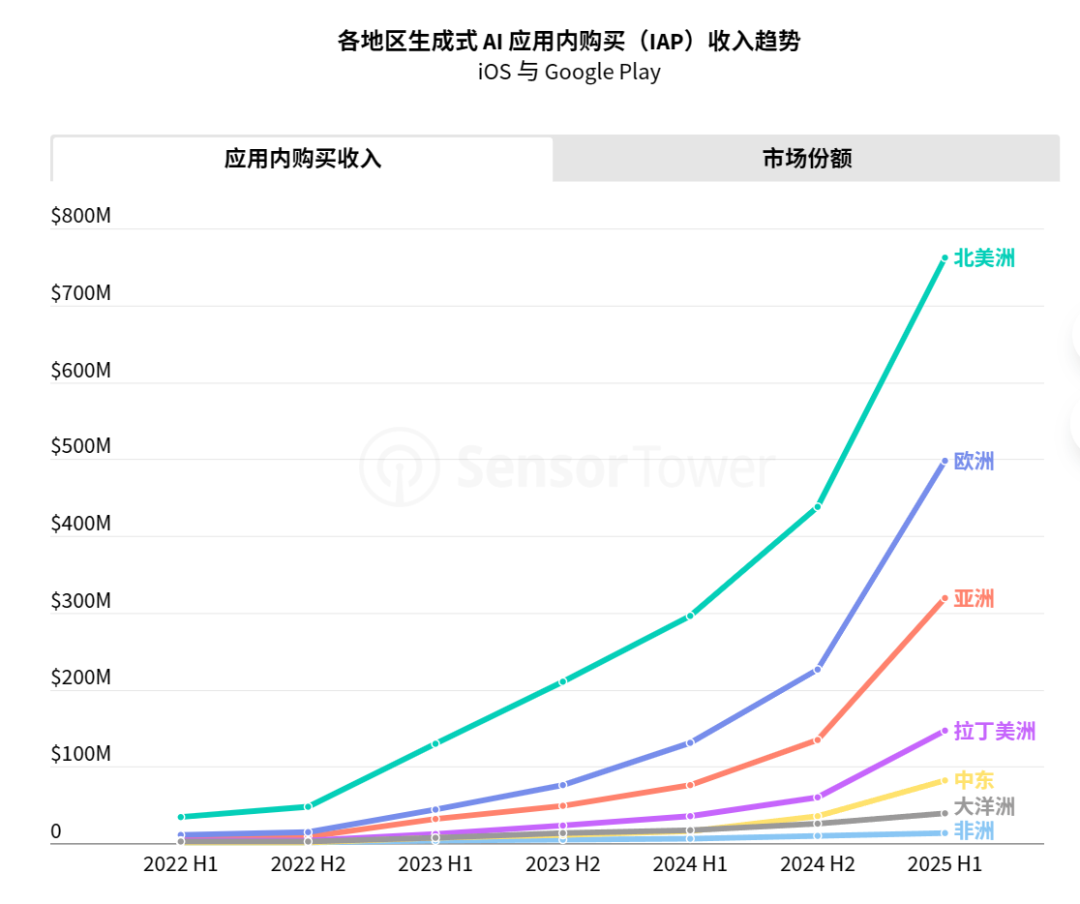
Market ranking of generative AI applications in the first half of 2025
Sensor Tower has compiled the market ranking of generative AI applications for the first half of 2025, detailing the download volumes, IAP revenue, and monthly active users of AI applications across different regions and countries, along with corresponding growth trends. The statistics are sourced from iOS and Google Play platforms.
Download volume and growth ranking
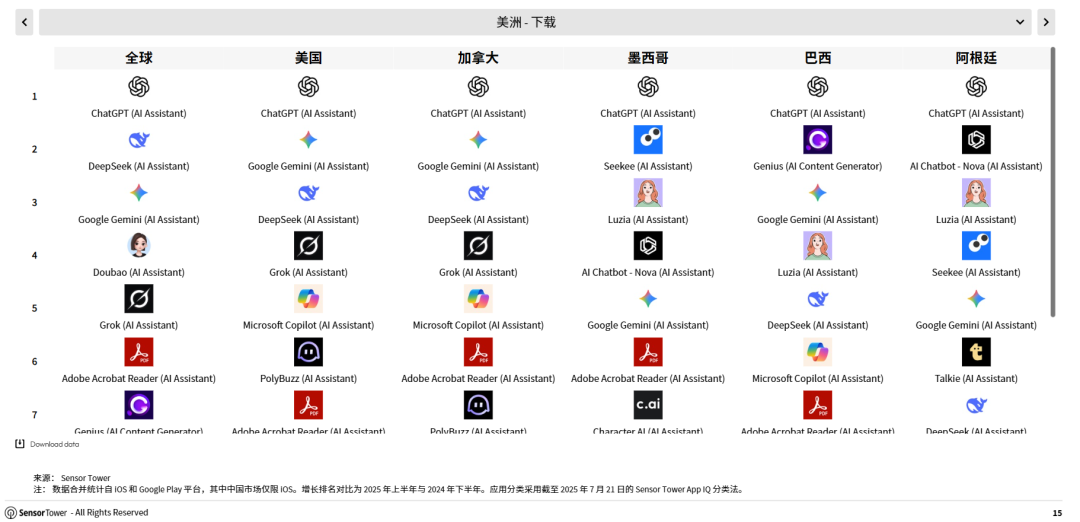
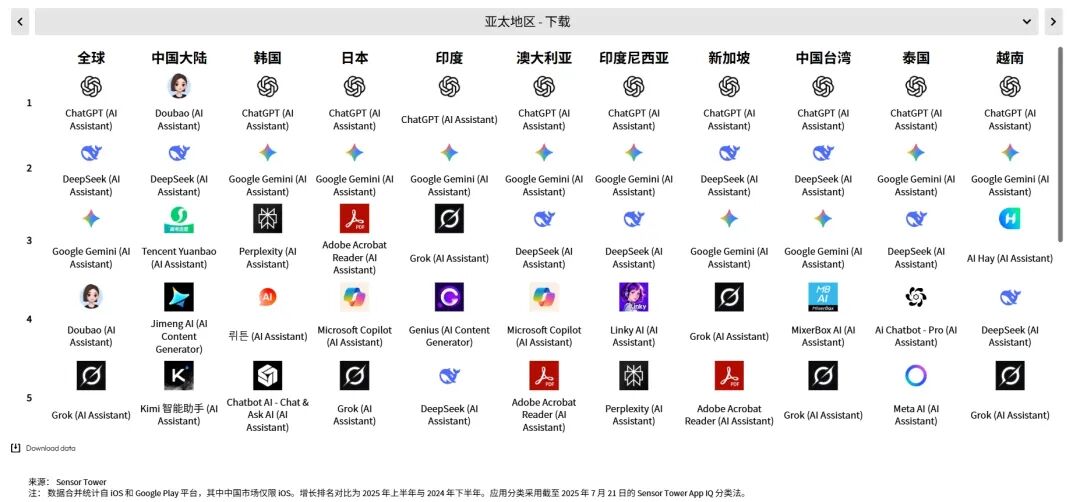
In-app purchase revenue and growth ranking
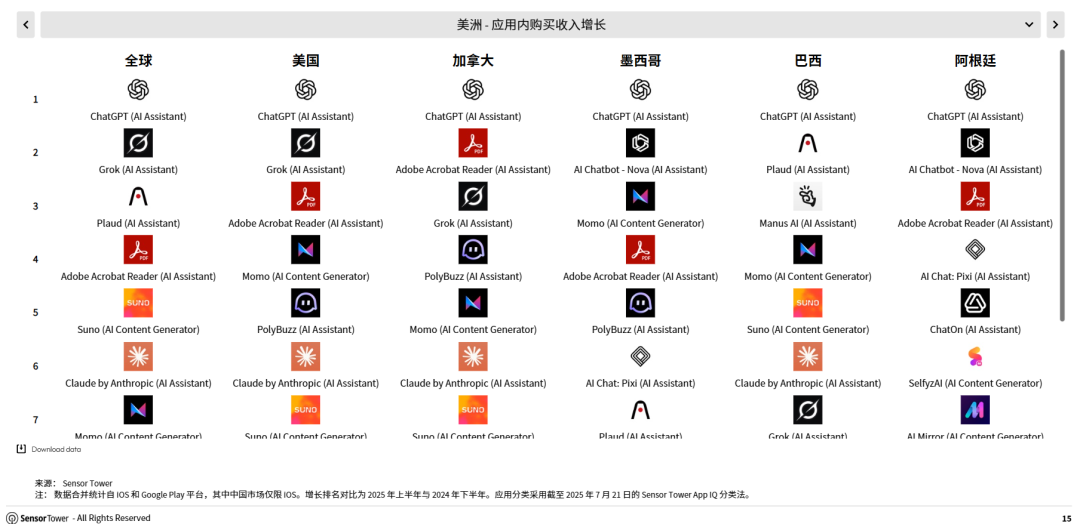
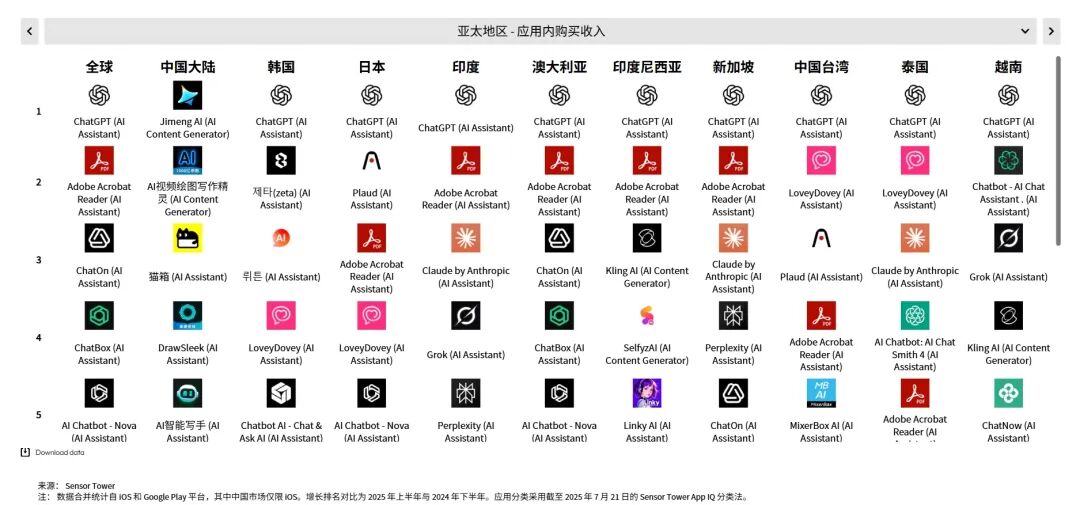
Monthly active users and growth ranking
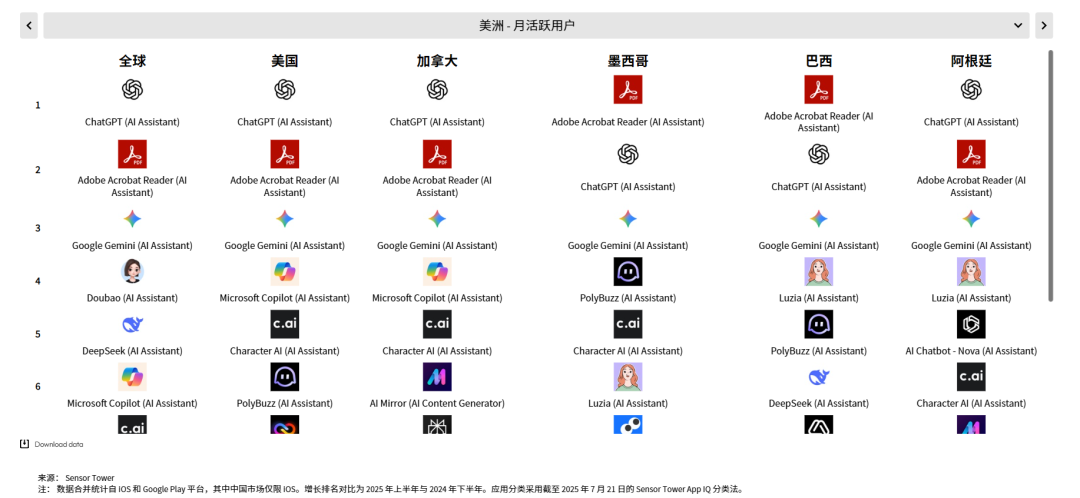
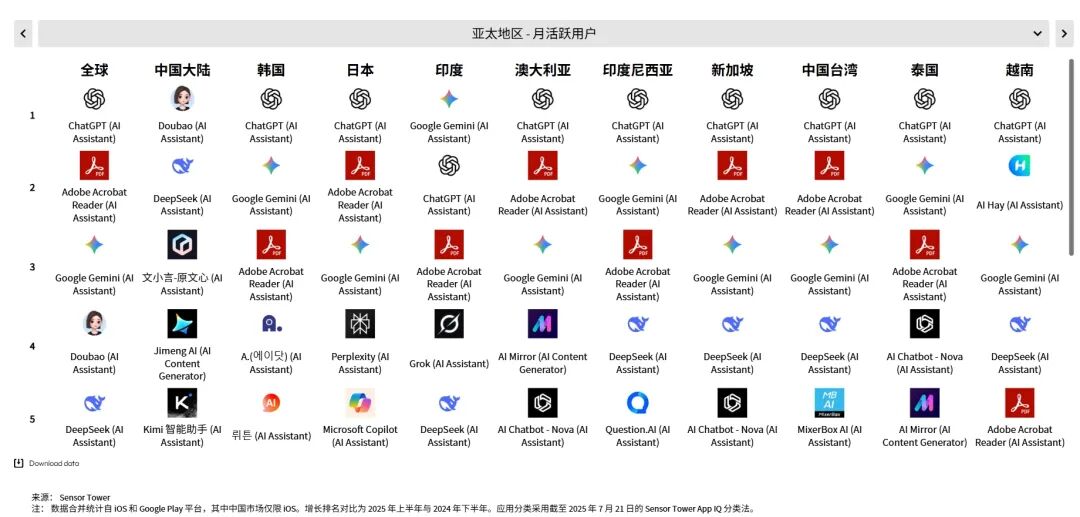
ChatGPT's user engagement is rapidly increasing, with health and shopping being its fastest-growing application scenarios
The report finds that consumer acceptance of AI assistants continues to rise. Among them, the user rate of ChatGPT across all platforms is steadily climbing.
AI assistant user profile: Young males still dominate
Despite the expanding audience base for generative AI applications, the user demographic still significantly skews towards young males. Even highly popular applications, such as ChatGPT (which has only 15 non-preinstalled applications globally with monthly active users exceeding 500 million), primarily attract this demographic. In the US market, nearly 70% of ChatGPT users are male, with 64% of users under the age of 35. Analyzing the user profile of generative AI applications reveals a diverse audience structure. While most AI assistants, such as DeepSeek, Claude, and Grok, still have a predominantly male user base, leading applications like ChatGPT, Microsoft Copilot, and Google Gemini have successfully expanded their user base, achieving a relatively balanced gender distribution, with female users accounting for over 30%. Meanwhile, AI applications focused on entertainment, such as PolyBuzz and Character AI, have gained favor among young female users due to their unique positioning. This trend indicates that as AI functionalities and application scenarios become increasingly rich, the user base is also becoming more segmented and diversified.
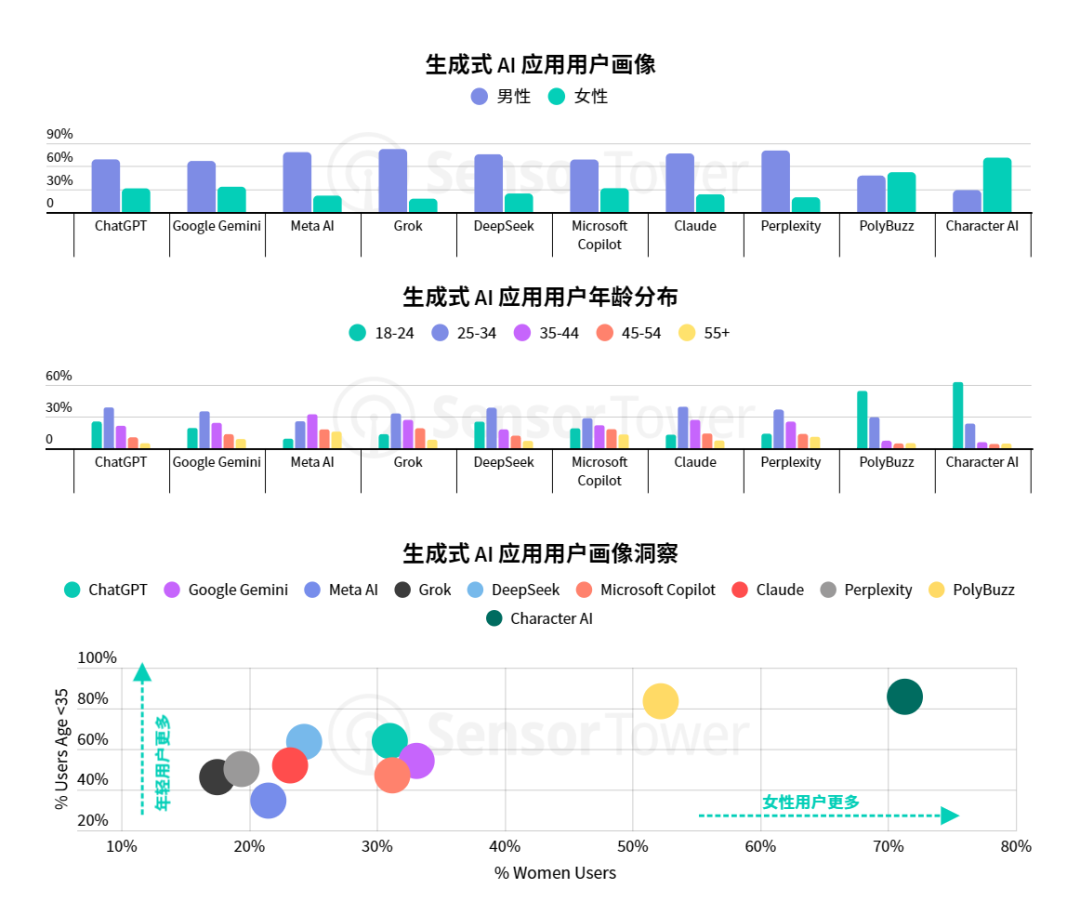
ChatGPT's user engagement rapidly increases, usage frequency comparable to X and Reddit
The report shows that user engagement with ChatGPT is rapidly increasing, with an average of 13 days of use per month, which is roughly on par with popular social platforms like X and Reddit. In contrast, Threads, which was launched around the same time, has maintained an average usage of 9-10 days per month. Nevertheless, Google remains the "gold standard" for mobile users seeking information. Data from June 2025 indicates that users average over 18 days of using Google per month. This suggests that in terms of sustained and frequent use, ChatGPT (and more broadly, AI assistants) has not yet fully replaced traditional search engines like Google.
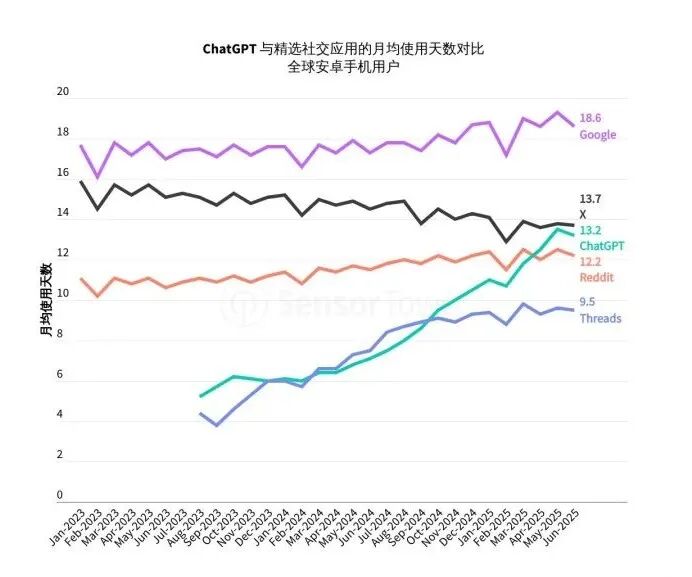
ChatGPT's weekend usage surges
Typically, the usage of work-oriented applications like Microsoft Teams and Slack sees a significant drop on weekends. In the first half of 2024, ChatGPT exhibited a similar pattern, with higher usage on weekdays, although the fluctuations were not as pronounced. However, by the first half of 2025, this trend in ChatGPT's mobile usage significantly weakened, and its usage pattern became closer to that of Google. This indicates that ChatGPT is no longer confined to work scenarios and is increasingly becoming a core tool for users to access information during both work and non-work hours.
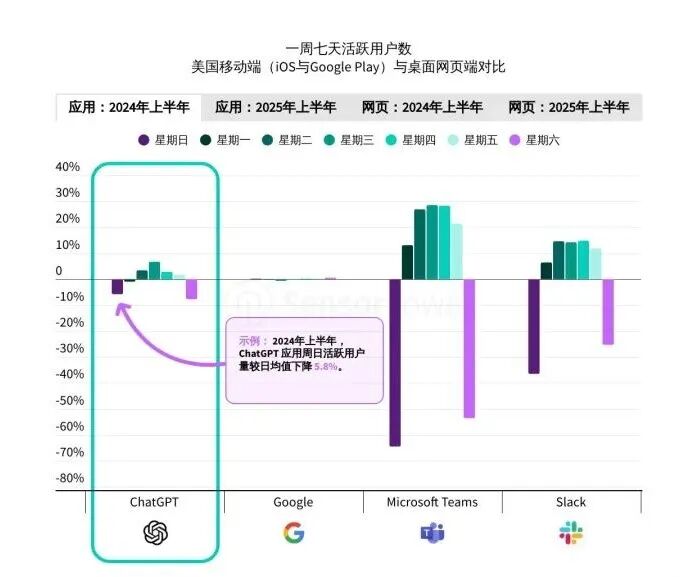
Over one-third of ChatGPT conversation keywords are related to life and entertainment
In the past year, the usage scenarios for ChatGPT have undergone a significant transformation, rapidly expanding from a purely work and educational tool to encompass life and entertainment. Data shows that the proportion of conversation keywords related to life and entertainment has risen from 22% in Q2 2024 to nearly 35% in Q2 2025. Nevertheless, work and education-related conversation keywords still represent the core value of ChatGPT. In Q2 2025, these types of conversation keywords accounted for nearly 60% of the total. Although their growth rate is lower than that of life and entertainment categories, the total volume continues to increase, indicating that ChatGPT's importance in work and learning scenarios has not diminished.
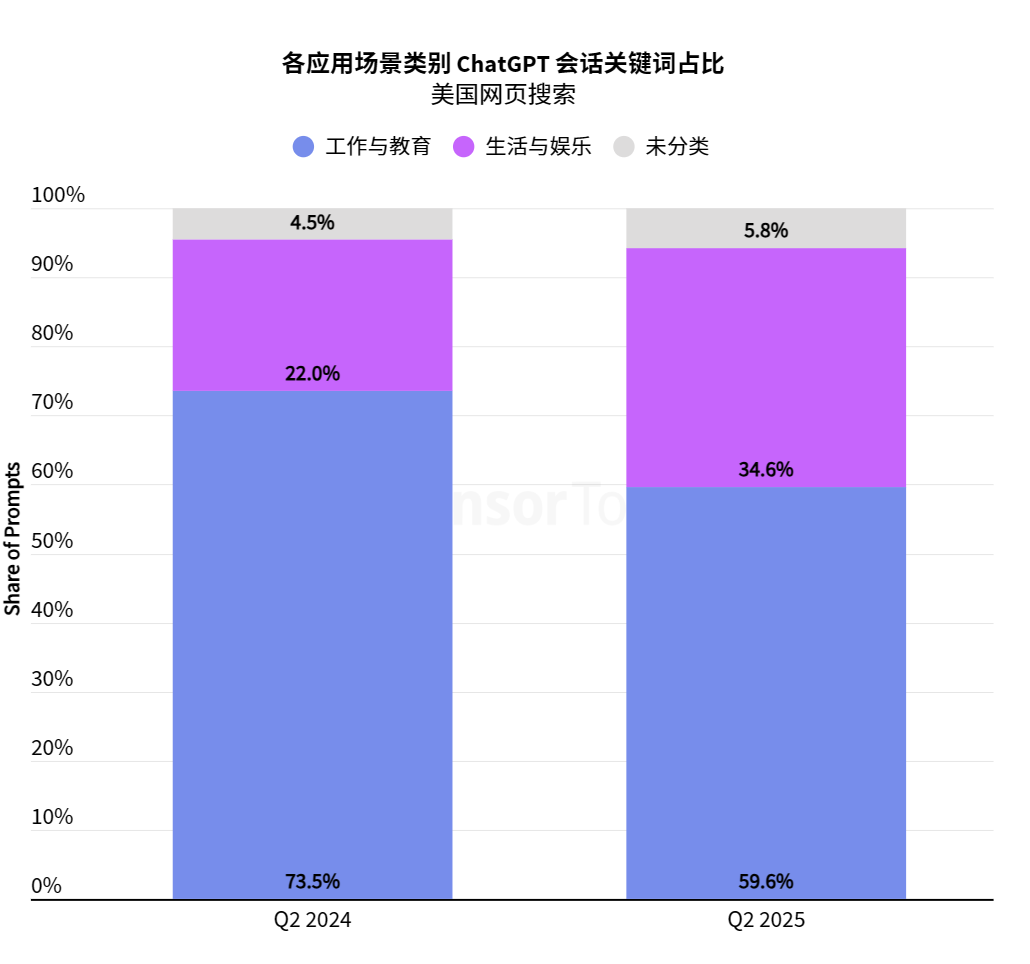
Health and shopping become the fastest-growing application scenarios for ChatGPT
By analyzing the conversation keyword data for ChatGPT in the US market, the report finds that consumer demand for ChatGPT is becoming increasingly diversified, covering a wide range of areas including shopping, meal preparation, fun knowledge, and pop culture. The usage scenarios for AI have effectively far surpassed the realms of work and education.
From Q2 2024 to Q2 2025, among the top ten categories with the fastest growth in conversation keyword proportions, nine belong to the life and entertainment category, with health and wellness showing particularly notable growth. This trend not only indicates that ChatGPT's user base has significantly broadened but also reflects that consumers are becoming more adept at applying this tool in diverse scenarios.
In contrast, the categories with the largest declines in conversation keyword proportions are primarily concentrated in programming assistance, language learning and translation, and writing and editing.
While these remain some of ChatGPT's core application scenarios, the relative decline in their proportions suggests that users are actively exploring more new and creative ways to utilize AI for broader information and assistance.
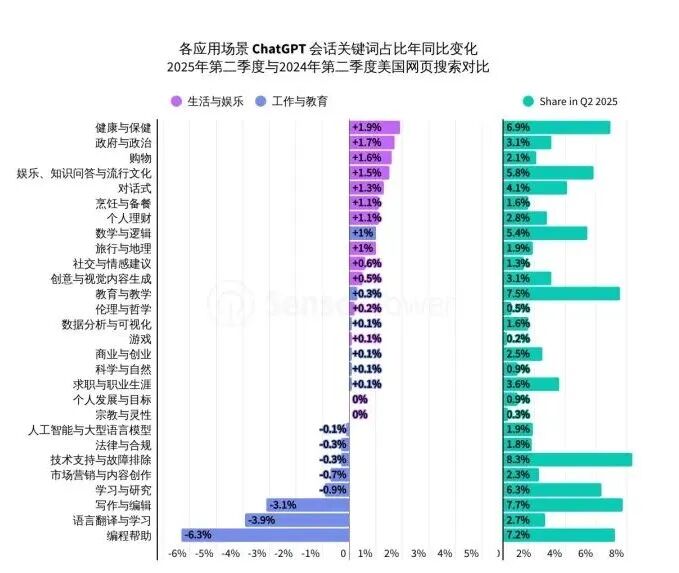
ChatGPT's usage pattern increasingly resembles that of search engines
ChatGPT is demonstrating significant potential to disrupt traditional search. In recent years, its user engagement metrics have consistently soared, now rivaling top search engines and browser applications. Data shows that in the first half of 2025, the average number of daily conversations per ChatGPT user reached 7.8, a 37% increase from 2024, slightly exceeding the average levels of leading search engines and browser applications. Although there is still a slight gap in average daily usage time, this gap is narrowing significantly: during the same period, users spent an average of 16 minutes per day on ChatGPT, a 58% increase from 2024. The rapid growth in both conversation numbers and daily usage time strongly indicates that ChatGPT is gradually becoming the preferred tool for consumers to access information.
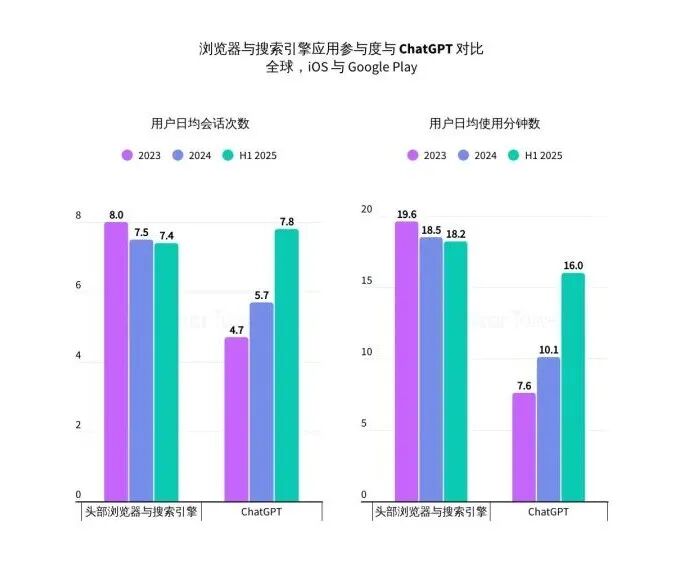
"AI+" has become a standard configuration in vertical application fields, with note-taking and nutrition applications frequently mentioning AI
The report finds that the influence of AI in the mobile application ecosystem has far exceeded the realm of chatbots. Currently, the term "AI" appears over 100,000 times in application descriptions on iOS and Google Play platforms.
In the first half of 2025, applications integrated with AI features achieved 7.5 billion downloads, accounting for about 10% of the total downloads of all applications during the same period. Compared to the same period last year, the downloads of these AI-enhanced applications saw a significant increase of 52%.
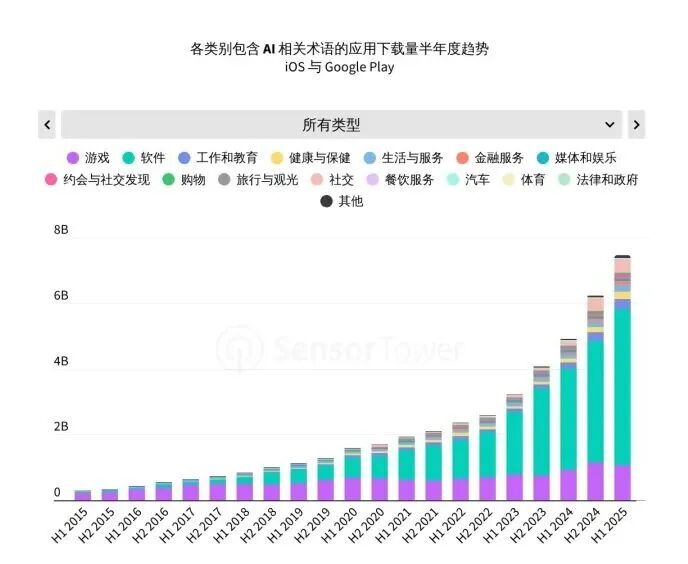
From a more granular perspective, certain subcategories are becoming the core drivers of this rapid growth. For example, in the health and wellness sector, applications related to nutrition and medical tracking that mention AI are experiencing significant surges in downloads.
AI features are becoming standard in nutrition applications
In the nutrition application field, AI-driven calorie scanners are rapidly becoming an essential feature. Meanwhile, other application subcategories are facing fierce competition from AI assistants like ChatGPT and DeepSeek. For instance, exam preparation and translation are common application scenarios for ChatGPT. Therefore, related vertical applications must actively develop and integrate more competitive AI features to surpass the services provided by AI assistants, or they risk being replaced.
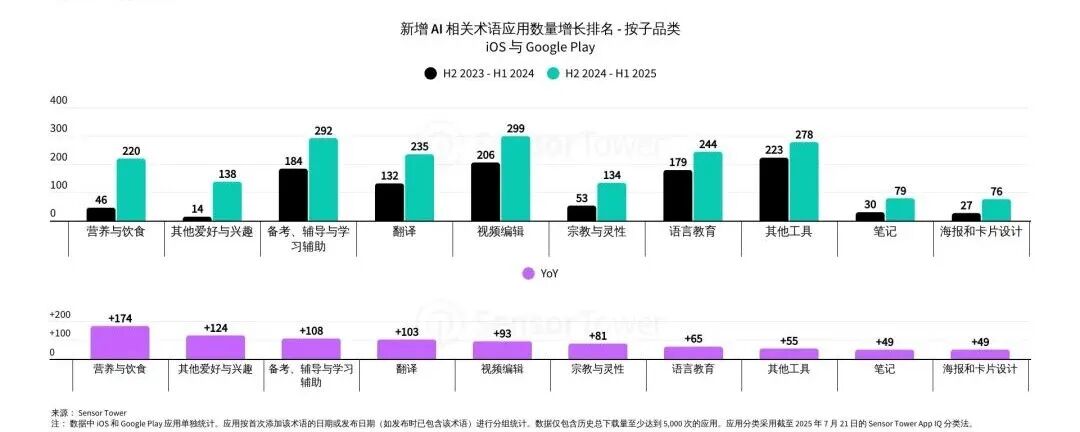
"Vertical Field App + AI Features" becomes the secret to competitiveness
All mobile vertical fields are continuously launching new AI features. The report ranks the number of applications that added AI features in the first half of 2025. In addition to AI-native applications, photo editing, tutoring, video editing, and nutrition applications are increasingly incorporating AI features.
Moreover, adding terms like "AI" or "LLM" to application names or descriptions has led to significant short-term increases in downloads. However, the performance varies across different types of applications.
For example, job search and education, as well as life and service applications, have maintained growth in downloads within three months after adding AI terminology, while the download increases for health and wellness applications have been more short-lived. Notably, in dating applications, adding AI-related terms seems to have a negative impact. This phenomenon reflects users' inherent concerns about AI technology when seeking genuine interpersonal interactions.
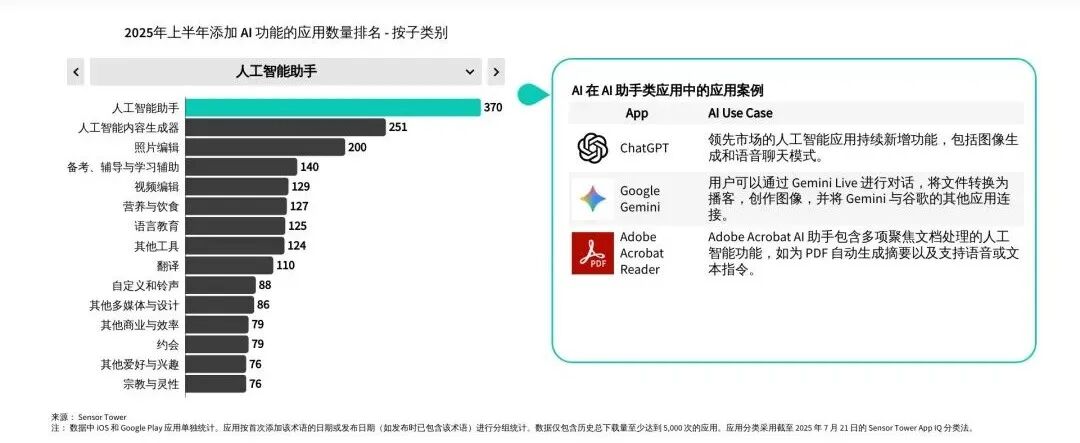
Note-taking and nutrition application names in app stores frequently include the term "AI"
The report analyzes different subcategories of applications and finds that on the iOS platform, over a quarter of the top applications in several categories explicitly include the "AI" designation in their names.
Notably, in the photo editing category, six of the top ten applications (and 37 of the top 100 applications) include the term "AI" in their names.
At the same time, competition in subfields such as translation, note-taking, and nutrition is becoming increasingly fierce, with emerging applications massively integrating AI technology. On the iOS platform, over 20% of the top 100 applications in these categories mention "AI" in their names, and in reality, even more applications integrate AI features without explicit labeling.
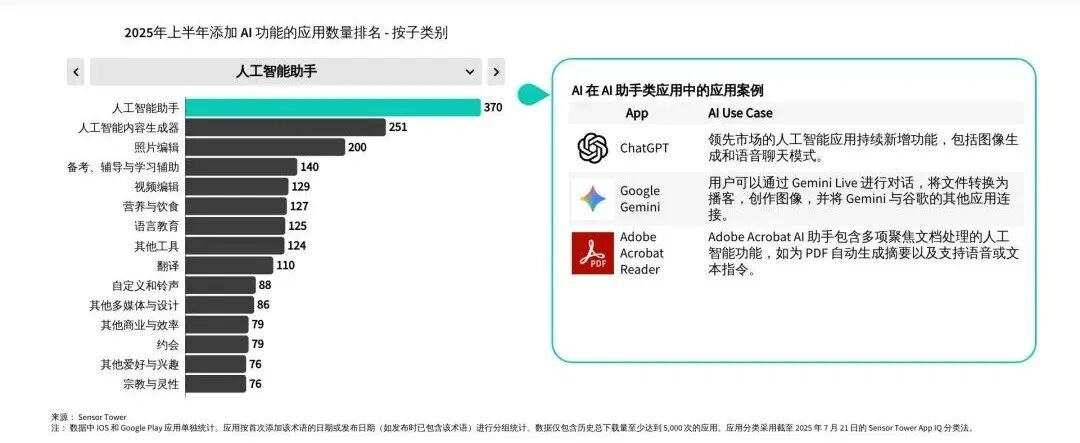
Which vertical fields are being disrupted by AI?
As the functionalities of general-purpose AI applications like ChatGPT continue to expand, some leading applications in vertical fields are facing potential risks of being replaced. These general tools are being used by users in innovative ways, which may directly substitute certain specific application scenarios. However, preliminary analysis shows that the impact of AI on mobile application subcategories presents a differentiated trend. Some applications continue to maintain strong growth in key mobile performance indicators (KPIs). To survive and thrive in this wave of transformation, these specialized applications must actively seek innovation and differentiate themselves to compete against general AI chatbots. This means they need to deeply integrate AI functionalities tailored to the subtle needs of their target audience and specific scenarios. For example, nutrition and diet applications can develop high-precision AI meal recording features based on photo recognition, providing specialized solutions that general AI finds difficult to match, thereby consolidating their market advantage.
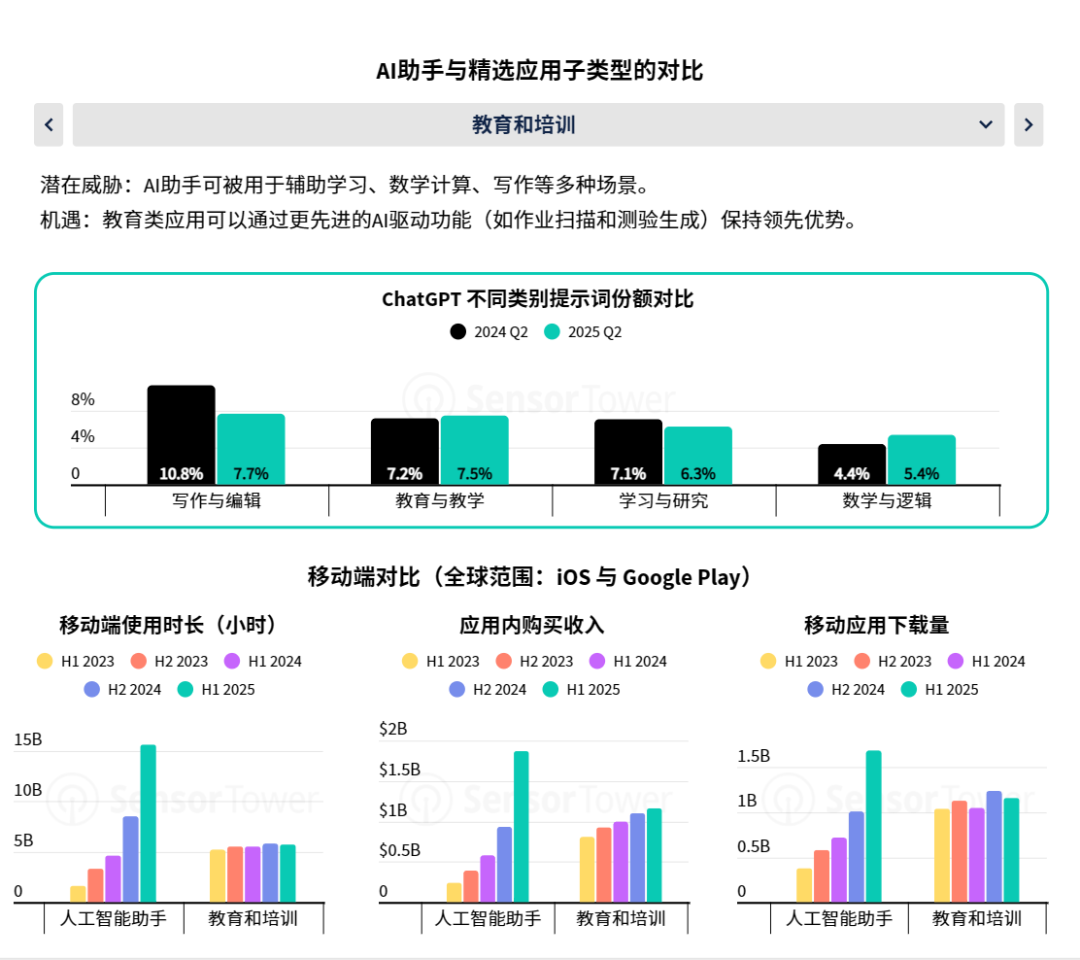
Leading AI applications are promoting image generation and voice modes
The report analyzes the new features promoted by several leading AI applications and finds that many top applications are emphasizing their image generation and voice mode functionalities.
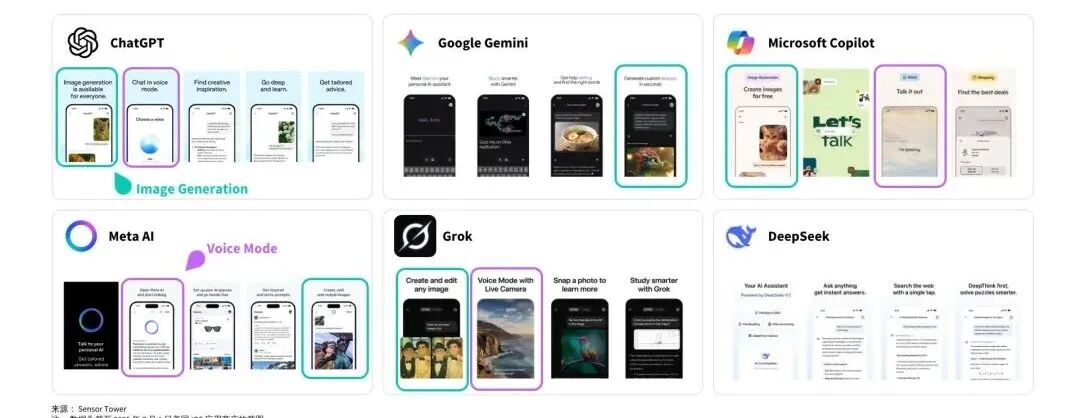
AI assistants are promoting cartoon-style image generation features
Leading AI assistants are positioning image generation capabilities as a core strategy to attract new users. Many applications are focusing on promoting their diverse image styles, especially cartoon and animation styles. These features, which are both fun and appealing to the public, provide an effective entry point for new users, encouraging them to actively explore and experience the built-in image generation capabilities of AI assistants.
ChatGPT and Gemini compete in image generation
As leading AI assistants like ChatGPT and Google Gemini increasingly focus on image generation functionalities, their keyword strategies in app stores have also adjusted, prioritizing the competition for rankings in AI image-related searches.
Data shows that in Q2 2025, in the US iOS App Store, ChatGPT and Google Gemini consistently held the 1st and 2nd positions for the search term "ai image." By the end of the quarter, both applications also made it into the top 15 for the search term "ai image generator," clearly demonstrating their strong competitive intent in the field of image generation.
At the same time, promotional descriptions targeting image generation search functionalities have significantly boosted the download volumes of ChatGPT and Gemini.
The downloads driven by image-related searches for ChatGPT and Google Gemini have shown steady growth.
Although this portion of downloads still represents a small percentage of the total download scale, these downloads from precise searches have become an additional source of revenue in the overall ASO strategy for both applications.
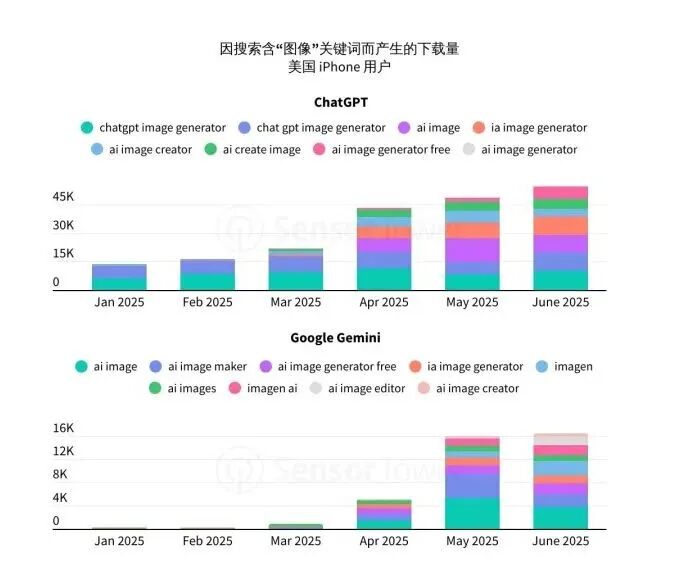
免责声明:本文章仅代表作者个人观点,不代表本平台的立场和观点。本文章仅供信息分享,不构成对任何人的任何投资建议。用户与作者之间的任何争议,与本平台无关。如网页中刊载的文章或图片涉及侵权,请提供相关的权利证明和身份证明发送邮件到support@aicoin.com,本平台相关工作人员将会进行核查。




